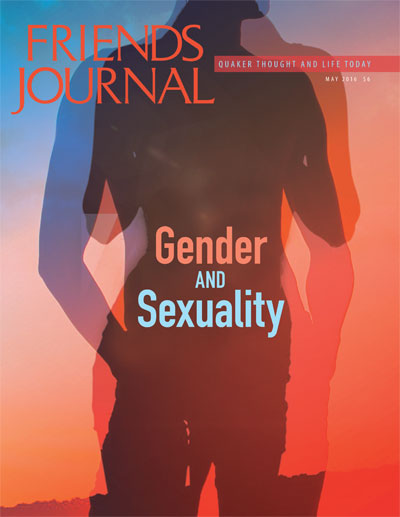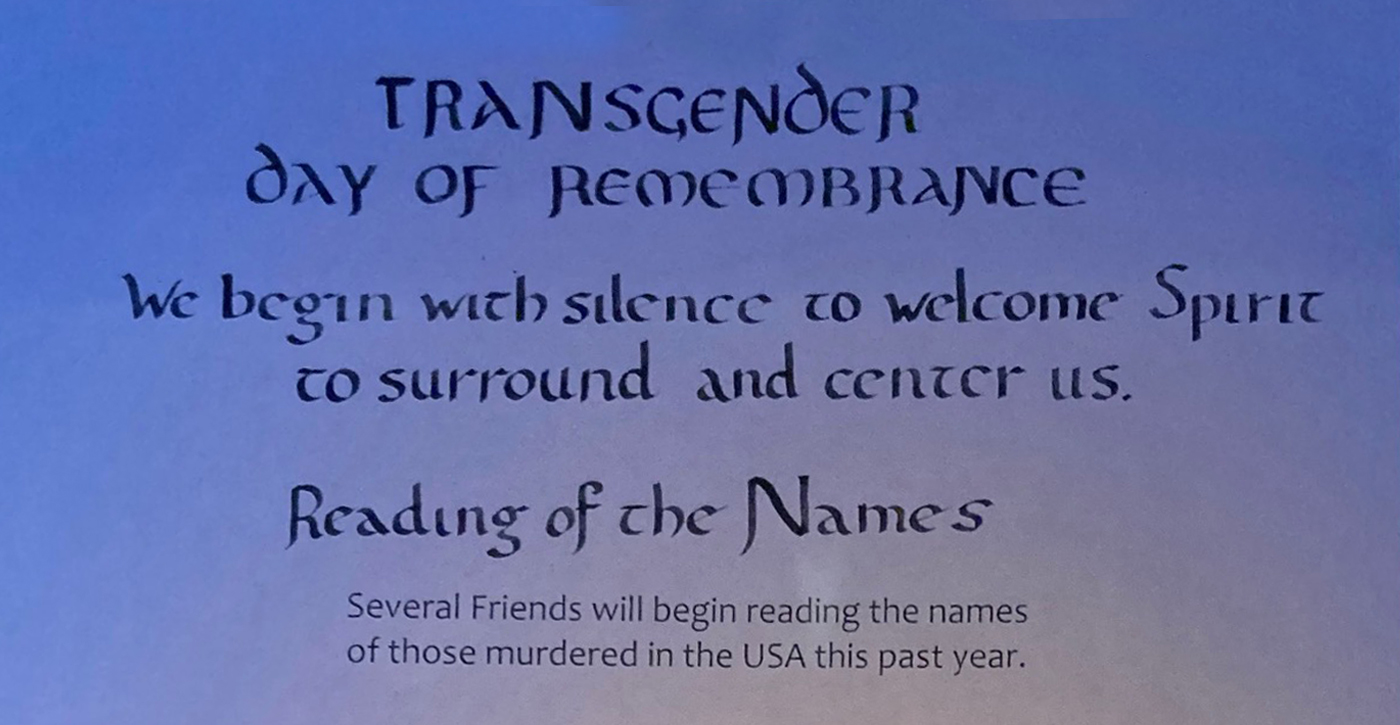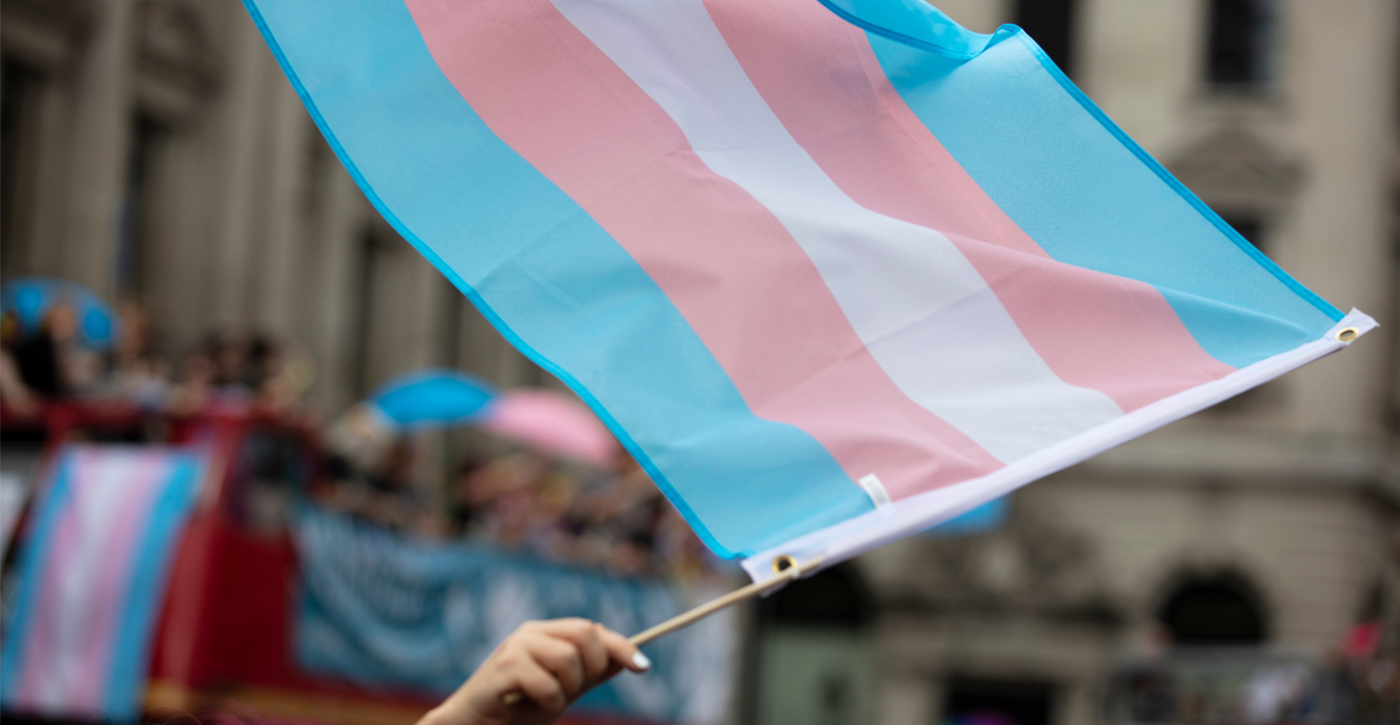
Since 1967 Aretha Franklin has been singing Carole King and Gerry Goffin’s famous song, “(You Make Me Feel Like) A Natural Woman.” In some ways, I never really heard it until today, when I took in the video of her performance at the Kennedy Center Honors event on December 6, 2015. Hmmm . . . a natural woman?
“Natural” is a troublesome word for a transgender woman. The various scientific, medical, and popular media descriptions of a gender transition from male-embodied to female-embodied are confusing enough for anyone on the outside of the transgender phenomenon. Yet even for those like me who find themselves placed upon this path—through no choice of my own—the meaning of “transgender” and the sense of self now versus then remain spiritually obscure. Is it “natural” to be a transgender woman? Will American society and our Religious Society of Friends ever be mature, caring, and spiritually grounded enough to accommodate diversity’s outer limits, where transgender folk often feel we are situated? Is there a spiritual takeaway to my life’s gender identity journey that hovers just out of reach, despite my outstretched (and very female) arms?
The still, small voice has not left me empty. I have felt the currents of a complex spiritual awareness surge within me from as tender an age as seven years old. In the more than five decades that have passed since then, at many points of revelation, crisis, insight, or transformation, there have been moments of profound, if often unsettling, spiritual awareness. My initial embrace of Quakerism at Westminster Meeting in 1990 when I lived and worked in London was itself transformative; that weighty and wonderful meeting nurtured my spiritual journey in ways I hadn’t previously known were even possible. Still, it wasn’t until 2013 that I felt led to seek the support of Adelphi (Md.) Meeting in discerning what that voice—no longer quite so still or small—was now saying to me. Through a clearness process, I came to understand that I was being called to a traveling ministry of outreach, initially to other meetings within Baltimore Yearly Meeting (BYM).
The weight of this calling was evident from the outset. I therefore availed myself of an excellent clearness committee to assist me in seasoning what I felt so strongly inside, and to give it clarity of form and direction. In due course, it was evident to me that I was being called to help Quakers to become both sensitized to and welcoming of a form of diversity to which few had much prior exposure. Even those who expressed some knowledge or awareness of transgender realities generally conflated these with issues of sexual orientation, from which they are distinct. In 2013 I wrote separate letters to the clerks of most of the 42 BYM meetings, attaching to each a photocopy of my meeting’s traveling minute, and asking if the meeting was open to a visit from me for a worship-based conversation on Quakerism and transgender concerns. Most did not respond, but I did receive invitations to come to Friends in some meetings in Maryland (Annapolis, Frederick, and Patapsco); in Pennsylvania (Carlisle); in Virginia (Floyd); and twice to Washington D.C. (once to their First-day middle school group).
On each of these visits, my support committee never failed to provide me with someone to accompany me. In retrospect I cannot imagine how I ever would have been able to travel in this ministry without these knowledgeable and caring Friendly presences at my side. At each meeting where I spoke, the words came out of the silence, yet as the words moved through me, they touched many soul-chords that vibrated with a blend of pain from my years of denial and struggle and joy from my claiming of a self that finally felt whole and alive. Often the pain was too poignant to recall, as I moved very close to a dangerous, dark edge of rawness and desolation. This was a spiritual sharing that clearly moved many who heard me but came at too high a cost to myself. Then again, there were many moments where I was led to share something of the joy of the experience of coming to wholeness, to authenticity, and to a radiant brightness that had been inaccessible the first five decades of my life. This joy also moved many in our shared worship. With both the shared pains and joys, often there were tears; not all of them were mine.
In 2014, with the guidance of my support group, I laid this ministry down, at least in that form. Delving into those dark spaces of my soul was taking too heavy a toll on me, and while I heard from many Friends that the words that had passed through me had indeed been an opening for them, it was more than I could or should sustain. That in itself was an opening for me and others: lessons about not diminishing the depth of the struggle that many transgender persons like me have endured, and about not assuming that it all simply goes away as we grow into the light of the gender identity to which we have been called. Of course all, not just transgender persons, carry their own struggles with them throughout their lives, and perhaps the wisdom made available through carrying such burdens makes it all possible. Still, revisiting those earlier struggles in such emotional detail was to reopen deep wounds, possibly quite perilous to my soul; gleaning wisdom does not require that proximity.
My visit in June 2014 to Virginia Friends in the small but very hospitable meeting at the southernmost point of BYM, Floyd Meeting, was particularly memorable in that my then 14-year-old daughter, Audrey, accompanied me. She is not a regular attender at Quaker meeting, but having her alongside me was precious in this instance. While I do not recall the specifics of what I shared with Floyd Meeting (or any meeting, for that matter), I sensed that this opportunity for her to be present during that worship and sharing was a spiritual gift to us both.
My daughter, son, and former spouse were all fellow travelers on my transgender journey, even though none of us asked for this adventure. We each paid a dear price for this journey but, at least for me, my life grew into a bigger, much fuller, and more sustainable one. It is no exaggeration to state that had I not transitioned, I would not have been able to continue to live. Such a loss would have cost my family more than I can bear to contemplate, but that was not my path. Instead I transitioned from Stephen to Chloe in 2007–2009, and I have now had several years to settle in to the woman I was meant to be.
In that time, I’ve learned that many questions remain unanswered, and some never will be. There is a significant degree of displacement in being a woman who was never a girl. There is a sense of loss and loneliness in discovering, again and again, that my heterosexual orientation is met with consternation and confusion (and sometimes much worse) when the time finally comes to explain my history to a man that I am dating. There is the emotional challenge of being a parent who has fathered two lovely children and who now feels like “Mom” but cannot claim that important title. There is the memory of the two jobs I lost simply because I am transgender, and the potential jobs that I was “disqualified” from when they Googled me (and my gender history) during my application process. There is the heavy moral weight I carry of the shared pain and intense suffering of the transgender women and men in developing countries with whom I work in my career as a human rights activist, educator, and international development practitioner. And there is the niggling irritation of being made “invisible” as society wrestles with “gay” rights, instead of “LGBTI” (lesbian, gay, bisexual, transgender, and intersex), when I and many like me are transgender but not gay.
Such challenges won’t find solutions within my lifetime, yet I know that I will learn how best to lay them down and let them be. In the interim, I do find energy and warmth in the sense of continuing wonder as I follow my spiritual leading, unpacking and exploring the insights and observations of a life in two genders. I am re-energized by my annual participation in BYM’s women’s retreat each January, and by worshiping each week with my dear Quaker community at Adelphi. I deeply value my friends and family, and I find new friends (and Friends) as I continue to pursue that lifelong quest of becoming myself.
I therefore leave the question unanswered as to whether I hold a legitimate claim to being a “natural woman.” Perhaps it will be more than enough just to be myself, and to stop the silly attempts to label myself!






Comments on Friendsjournal.org may be used in the Forum of the print magazine and may be edited for length and clarity.